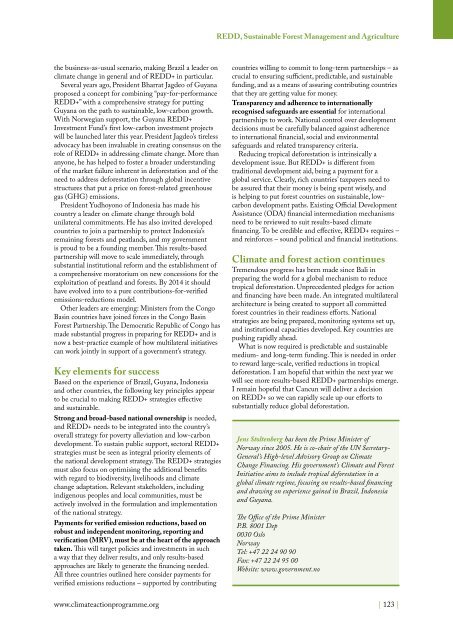Climate Action 2010-2011
Create successful ePaper yourself
Turn your PDF publications into a flip-book with our unique Google optimized e-Paper software.
Redd, Sustainable Forest Management and Agriculture<br />
the business-as-usual scenario, making Brazil a leader on<br />
climate change in general and of REDD+ in particular.<br />
Several years ago, President Bharrat Jagdeo of Guyana<br />
proposed a concept for combining “pay-for-performance<br />
REDD+” with a comprehensive strategy for putting<br />
Guyana on the path to sustainable, low-carbon growth.<br />
With Norwegian support, the Guyana REDD+<br />
Investment Fund’s first low-carbon investment projects<br />
will be launched later this year. President Jagdeo’s tireless<br />
advocacy has been invaluable in creating consensus on the<br />
role of REDD+ in addressing climate change. More than<br />
anyone, he has helped to foster a broader understanding<br />
of the market failure inherent in deforestation and of the<br />
need to address deforestation through global incentive<br />
structures that put a price on forest-related greenhouse<br />
gas (GHG) emissions.<br />
President Yudhoyono of Indonesia has made his<br />
country a leader on climate change through bold<br />
unilateral commitments. He has also invited developed<br />
countries to join a partnership to protect Indonesia’s<br />
remaining forests and peatlands, and my government<br />
is proud to be a founding member. This results-based<br />
partnership will move to scale immediately, through<br />
substantial institutional reform and the establishment of<br />
a comprehensive moratorium on new concessions for the<br />
exploitation of peatland and forests. By 2014 it should<br />
have evolved into to a pure contributions-for-verified<br />
emissions-reductions model.<br />
Other leaders are emerging: Ministers from the Congo<br />
Basin countries have joined forces in the Congo Basin<br />
Forest Partnership. The Democratic Republic of Congo has<br />
made substantial progress in preparing for REDD+ and is<br />
now a best-practice example of how multilateral initiatives<br />
can work jointly in support of a government’s strategy.<br />
Key elements for success<br />
Based on the experience of Brazil, Guyana, Indonesia<br />
and other countries, the following key principles appear<br />
to be crucial to making REDD+ strategies effective<br />
and sustainable.<br />
Strong and broad-based national ownership is needed,<br />
and REDD+ needs to be integrated into the country’s<br />
overall strategy for poverty alleviation and low-carbon<br />
development. To sustain public support, sectoral REDD+<br />
strategies must be seen as integral priority elements of<br />
the national development strategy. The REDD+ strategies<br />
must also focus on optimising the additional benefits<br />
with regard to biodiversity, livelihoods and climate<br />
change adaptation. Relevant stakeholders, including<br />
indigenous peoples and local communities, must be<br />
actively involved in the formulation and implementation<br />
of the national strategy.<br />
Payments for verified emission reductions, based on<br />
robust and independent monitoring, reporting and<br />
verification (MRV), must be at the heart of the approach<br />
taken. This will target policies and investments in such<br />
a way that they deliver results, and only results-based<br />
approaches are likely to generate the financing needed.<br />
All three countries outlined here consider payments for<br />
verified emissions reductions – supported by contributing<br />
countries willing to commit to long-term partnerships – as<br />
crucial to ensuring sufficient, predictable, and sustainable<br />
funding, and as a means of assuring contributing countries<br />
that they are getting value for money.<br />
Transparency and adherence to internationally<br />
recognised safeguards are essential for international<br />
partnerships to work. National control over development<br />
decisions must be carefully balanced against adherence<br />
to international financial, social and environmental<br />
safeguards and related transparency criteria.<br />
Reducing tropical deforestation is intrinsically a<br />
development issue. But REDD+ is different from<br />
traditional development aid, being a payment for a<br />
global service. Clearly, rich countries’ taxpayers need to<br />
be assured that their money is being spent wisely, and<br />
is helping to put forest countries on sustainable, lowcarbon<br />
development paths. Existing Official Development<br />
Assistance (ODA) financial intermediation mechanisms<br />
need to be reviewed to suit results-based climate<br />
financing. To be credible and effective, REDD+ requires –<br />
and reinforces – sound political and financial institutions.<br />
<strong>Climate</strong> and forest action continues<br />
Tremendous progress has been made since Bali in<br />
preparing the world for a global mechanism to reduce<br />
tropical deforestation. Unprecedented pledges for action<br />
and financing have been made. An integrated multilateral<br />
architecture is being created to support all committed<br />
forest countries in their readiness efforts. National<br />
strategies are being prepared, monitoring systems set up,<br />
and institutional capacities developed. Key countries are<br />
pushing rapidly ahead.<br />
What is now required is predictable and sustainable<br />
medium- and long-term funding. This is needed in order<br />
to reward large-scale, verified reductions in tropical<br />
deforestation. I am hopeful that within the next year we<br />
will see more results-based REDD+ partnerships emerge.<br />
I remain hopeful that Cancun will deliver a decision<br />
on REDD+ so we can rapidly scale up our efforts to<br />
substantially reduce global deforestation.<br />
Jens Stoltenberg has been the Prime Minister of<br />
Norway since 2005. He is co-chair of the UN Secretary-<br />
General’s High-level Advisory Group on <strong>Climate</strong><br />
Change Financing. His government’s <strong>Climate</strong> and Forest<br />
Initiative aims to include tropical deforestation in a<br />
global climate regime, focusing on results-based financing<br />
and drawing on experience gained in Brazil, Indonesia<br />
and Guyana.<br />
The Office of the Prime Minister<br />
P.B. 8001 Dep<br />
0030 Oslo<br />
Norway<br />
Tel: +47 22 24 90 90<br />
Fax: +47 22 24 95 00<br />
Website: www.government.no<br />
www.climateactionprogramme.org | 123 |












